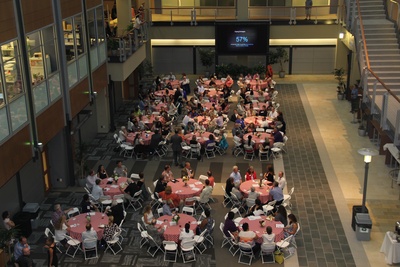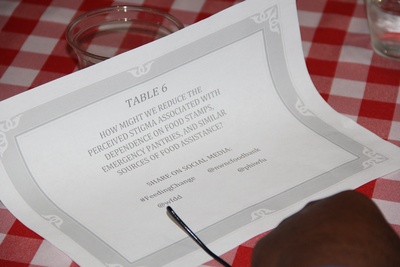SEE NOTE HERE: https://localwiki.org/Users/kimdabney
 People gathered around tables at the Innovation Quarter in Winston Salem to discuss ways to reduce hunger in the area served by the Second Harvest Food Bank of Northwest North Carolina. Photo: Courtesy of Patricia Furnish
People gathered around tables at the Innovation Quarter in Winston Salem to discuss ways to reduce hunger in the area served by the Second Harvest Food Bank of Northwest North Carolina. Photo: Courtesy of Patricia Furnish Attendees roamed tables to tackle difficult questions related to the problem of hunger. Photo: Courtesy of Patricia Furnish
Attendees roamed tables to tackle difficult questions related to the problem of hunger. Photo: Courtesy of Patricia Furnish
By Dabney Grinnan and Kim Smith
The non profit Second Harvest Food Bank of Northwest North Carolina works to reduce hunger in northwestern North Carolina. According to its website, the food bank:
- Acquires and distributes food to supplement the food needs of faith and community-based organizations;
- Advocates for the rights of hungry people
- Educates the public about hunger
- Pursues partnerships with like-minded organizations.
Last week, Second Harvest partnered with 160 advocates to exchange ideas on how to combat hunger in the Winston Salem, N.C. area.
At Wake Forest University's Innovation Quarter in downtown Winston Salem, academics, corporate leaders, small business men and women, politicians and people from organizations helping the poor sat across from people who had experienced what it was like to go hungry. They shared ideas on how to deal with the problem.
Organizers called the event Feeding Change: An Interactive Community Conversation on Hunger.
Speed dating 2.0
Going from table to table, like civic minded speed daters, they:
- Discussed ways to reduce stigmas associated with people who are poor and need of food
- Exchanged ideas on how to better engage the community to address food deserts
- Addressed the short and long-term needs of the hungry.
Moderators at the tables kept the conversations focused and asked questions designed to facilitate the discussion.
Commenting on the mix of people who showed up for the event, Jenny Moore, public relations director for Second Harvest said, "It's dots connecting,"
Second Harvest co-sponsored Feeding Change with Wake Forest University's Pro Humanitate Institute.
See Second Harvest promo.
The need is real.
"It's estimated that 1 in 6 people (more than 351,000) in this food bank's 18-county service area are food insecure, living with uncertainty about where their next meal will come from," according to the website.
Second Harvest distributed more than 25 million pounds of donated, purchased and prepared foods, to a network of 400 partner programs in 18 counties around Winston Salem, including more than 100,000 children in fiscal year 2013-2014.
See a map of the area's food needs at Map the Food Gap,
What's next?
The participants at "Feeding Change" discussed several possible solutions to solve the food gap. They included:
- Build more community gardens as a means of engaging communities in addressing food insecurities
- Establish more grocery stores in poor neighborhoods and have as a goal for those stores to sell healthy foods
- Persuade local churches to add community gardens to their much-appreciated food pantries
- Train and enable church members with farming skills to teach people how to grow fruits and vegetables and cook them from their community gardens.
Wake Forest University Provost Rogan Kersh led the final discussion and pledged to assemble the comments and present them to city officials and others in power who might be able to turn some of the recommendations into reality.


